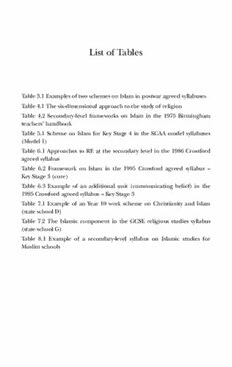
Islam in the School Curriculum: Symbolic Pedagogy and Cultural Claims PDF
272 Pages·2011·1.808 MB·English
Most books are stored in the elastic cloud where traffic is expensive. For this reason, we have a limit on daily download.
Preview Islam in the School Curriculum: Symbolic Pedagogy and Cultural Claims
Description:
Islam in the School Curriculum explores the conceptualisation of school-based Islam on two levels: as a symbolic category in English religious education as a consequence of policy shifts, and as pedagogic discourse at the local community level in state and Muslim schools. Using recontextualisation theory, the author examines the relations between educational governance, social interests and cultural epistemology as they pertain specifically to symbolic constructs.In the aftermath of September 11 2001, the teaching of Islam has assumed geopolitical significance, coming under close scrutiny internationally. Much of this attention has been directed at madrasas in Muslim countries, yet Islam in schooling contexts in the West has remained a blind-spot. In the UK, heightened anxieties about 'home-grown' terrorists point to the need for a better understanding of Islam in both state and faith schools.Shiraz Thobani explores the role played by national and local policies and pedagogic practices in the production of school-based Islam in a secular, liberal context and makes an important contribution to the sociology of the curriculum and the study of religious education.
See more
The list of books you might like
Most books are stored in the elastic cloud where traffic is expensive. For this reason, we have a limit on daily download.
